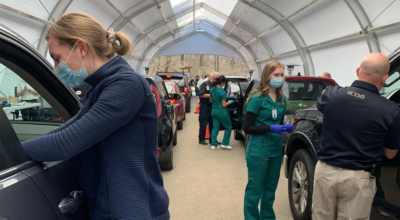
There are three permitless carry bills pending in the Legislature. One of those three is House Bill 786 / Senate Bill 765 which is commonly referred to as the “Governor’s bill” and which appears to be the only one that many Tennesseans realize is pending.
By John Harris / Tennessee Firearms Assn.
The other two bills House Bill 18 / Senate Bill 318 and House Bill1388 / Senate Bill 1391 are actually cleaner, less expensive and provide greater restoration of the right protected by the Second Amendment. At present, two of the bills, House Bill 18 and House Bill 786 have both as of this week been approved by the House Criminal Justice Committee and are moving rapidly toward the floor where hopefully all Legislators will have a chance to consider and debate them in a goal of passing the best bill in terms of removing infringements on our rights.
Generally, two of the bills would allow any person who can legally possess a firearm to carry it.
That would include those 18 and up and it would apply to any firearms. See, HB18/SB318 and HB1388/SB1391. The third bill, the governor’s bill, is more restrictive in that it applies only to handguns and it only applies to those who are at least 21 (or a small number of 18-20 year olds who are in or retired from the military).
Thus, two of the bills maximize the removal of existing infringements and one perpetuates infringements both on an age class and also with respect to a wide spectrum of arms that do not meet the definition of a handgun under Tennessee law. For purposes of this discussion, the phrase “real” or “true” constitutional carry will refer to an environment where anyone who can legally possess a firearm is able to carry that firearm (longarm or handgun) without a permit.
Road block to reform
The discussions in the Senate and House committees that have voted on these bills suggest that there is a swamp-like force at work that is serving as a road block to achieving real constitutional carry this year. Let’s look at the comments that were made in the committees that reveal the existence of this roadblock.
The governor’s bill (HB786/SB765) was considered in the Senate Judiciary Committee on March 2. At the conclusion of the testimony by the witnesses, Committee Chairman Sen. Mike Bell made comments that suggest the existence of a roadblock without identifying who or what it is. (See March 2 Senate video starting at approximately 3 hours, 27 minutes). These statements, which are also in the video clip at the bottom of this page, included comments as follows:

- “Is it [this bill] everything I may have wanted in a bill that creates permitless carry, no. But it gets the ball further down the field.”
- “I’m glad we are here and again moving the ball further down the court, we may come back to see how this works in a couple of years and come back and make some changes.”
- “its been a journey and this bill gets us closer”
- “The Second Amendment is truly a right that you should not have to go to government in order to recognize.”
- “This bill is not everything that everyone wanted, but it gets the ball further down the field”
Sen. Kerry Roberts also made some important comments in the Judiciary hearing (see 3 hours 33 minutes), which are also in the video clip at the bottom of this page, that are worth noting:
- “Regardless of what we do today, criminals are unaffected by this … what we are doing today only affects law abiding citizens….”
- “Is this bill Constitutional Carry? Well for many Tennesseans they view it as exactly that … I don’t believe its a true constitutional carry bill. But can I support it or can I not. It gets into that age old question that we wrestle with every legislative session, do we take an incremental gain as the sponsor address and moves it down field or do we hold out for what we really want. Its tough to know the answer to that. Sometimes we take the incremental gain only to find in subsequent sessions that legislators do not want to do any more work on the issue. … If this bill passes out of committee I simply want to say to the Legislators that our work is not done on this bill. Our work is not done on this topic. We are still creating a scenario that law abiding people are having to follow all these processes or all these laws to protect themselves and their love ones and criminals continue to be completely unaffected by this.”
It is important to note that neither applauded the bill as true constitutional carry. Neither proclaimed that it achieved the goal line victory of adopting constitutional carry. Sen. Bell noted that it moves the ball down the field but nothing is said about moving it pass the goal line. Sen. Roberts clearly states it is not constitutional carry but only an incremental step leaving more to be done later.
It is also important to note that not a single one of the 7 Republicans on the Senate Judiciary committee offered any amendment to Bill Lee’s bill that would make it constitutional carry and move it clearly to and across the goal line. If they know its not true constitutional carry, then why no amendments? Why no statements such as “we can only go so far this year because ….”
Then, on March 10, Representative William Lamberth presented the House version of the Governor’s bill, HB786, in the Criminal Justice Committee. In response to questions from Rep. Hardaway regarding whether the bill covered all firearms or only some firearms. Rep. Lamberth responded that the bill only covered handguns. He continued on regarding the bill’s limited scope by explaining that “there is not a distinction [between handguns and longarms] in the Second Amendment, there is a distinction in this particular bill, and this is the biggest bite of freedom we can get in one chunk” (Deference to video for exact wording).
Thus, the House Committee record reflects that while the Second Amendment protects a right that attaching to all firearms, the Governor’s bill falls short of Second Amendment’s prohibition at least as to longarms. The question remains – why is it that the biggest bite falls short this year? Why?
Growing mystery for 2A ‘backers’

The comments in these committees suggest that something or someone is prohibiting or blocking these elected legislators from running a bill that is true constitutional carry. But what or who is the roadblock? Is it that some other state or federal statute is the problem? Nothing is said. Is it that some other external factor has to be clarified or addressed first? Nothing is said.
The testimony and statements in these committee hearings do not reveal who or what is standing in the road blocking the attainment of true constitutional carry – although it appears clear that something or someone is and they know what or who it is.
Nothing has been said to explain why they seem to believe that an incremental step of merely moving the ball down the field is all that can be hoped for or attained this year.
That void of accountability and specificity should be eliminated and Tennesseans should be calling and asking their legislators what or who it is that is blocking the effort to get true constitutional carry enacted. What or who is it that is stonewalling this issue and instead causing these elected officials to be telling us at this time that only an incremental step can be achieved.
The Bill Lee problem
You should be calling your legislators about this. Perhaps those calls should inquire if Bill Lee or his taxpayer funded “liaisons” with the Legislature are the roadblock. After all, it is Bill Lee’s bill, right? He is claiming it as his own and even referencing it as constitutional carry. If Bill Lee wanted true constitutional carry wouldn’t we expect his bill to provide it? Is Bill Lee the problem on this issue?
Although he is not constitutionally a policy maker because he is in the administrative and not in the legislative branch, he still holds substantial power. His administration has full control over discretionary parts of the budgets such as when and where roads are built, expanded or repaired in legislative districts. He likely has other discretionary powers that impact the districts of legislators as well.
That or similar administrative powers might be used as an effective roadblock.
McNally, Sexton?
Perhaps your calls to individual legislators also need to ask if the roadblock is coming from Lt. Gov. Randy McNally or Speaker Cameron Sexton — or even both. As the leaders of the respective houses, they have certain unbridled powers that impact individual legislators like committee assignments, chairmanship assignments, even office assignments, and other similar functions that they essentially unilaterally control.
Certainly history teaches that prior speakers and lieutenant governors have not only held but effectively used such powers to control not only what bills are heard but which bills and amendments are killed. Although they hold this unique power, each of them only has the same number of votes on the floor of their respective houses as any other House or Senate member – one. Neither have – constitutionally – a veto power or gatekeeper authority. Thus, while it is possible that either or both of these men have the power to roadblock or stonewall legislation the question that begs an answer is are they using it now on this issue?
You might also ask your legislators if the roadblock is actually coming perhaps from committee chairmen, as it has in the past, or from the bill sponsors. That is a possibility but the statements that Chairman Bell and Representative Lamberth have made seem to suggest that the source of the roadblock lies elsewhere. Certainly, each of them, including Sen. Jack Johnson (the technical Senate sponsor on the governor’s bill) could have introduced a full constitutional carry bill or offered amendments on the bill to achieve that by now but they have not. But again, this is the governor’s bill and it may be that decorum prohibits such amendments or steps without prior consent from Bill Lee.
No bill ‘injurious’ to the people
Article X, Section 2. Each member of the Senate and House of Representatives, shall before they proceed to business take an oath or affirmation to support the Constitution of this state, and of the United States and also the following oath: I______ do solemnly swear (or affirm) that as a member of this General Assembly, I will, in all appointments, vote without favor, affection, partiality, or prejudice; and that I will not propose or assent to any bill, vote or resolution, which shall appear to me injurious to the people, or consent to any act or thing, whatever, that shall have a tendency to lessen or abridge their rights and privileges, as declared by the Constitution of this state.
The oath specifically includes a declaration that a) they “will not propose or assent to any bill, vote or resolution, which shall appear to me injurious to the people,” nor b) will they “consent to any act or thing, whatever, that shall have a tendency to lessen or abridge their rights and privileges, as declared by the Constitution of this state.”
The issue of taking an incremental step towards the repeal of laws which they apparently believe constitute an infringement of the rights protected by the Second Amendment would appear to some to fall within the scope of the oath.


